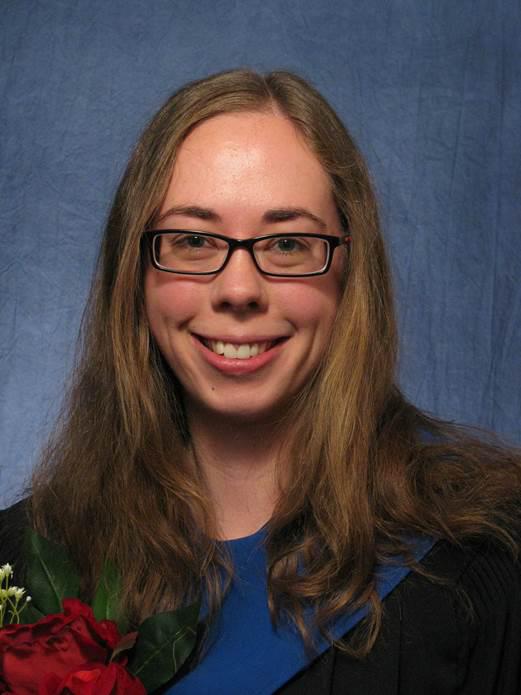First graduate of Briercrestís TESOL after degree program is pleased with her experience

Carla Heinrichs came to Briercrest a little unsure what to expect from a Bible college, but is preparing to leave two years later with a Bachelor of Arts (BA) degree in hand and a smile on her face.
‚ÄúI was a little bit leary of coming to Briercrest in the beginning because I heard a lot of scary stories about Bible schools and cult schools, but I have been very pleasantly surprised,‚ÄĚ Heinrichs, first graduate of Briercrest‚Äôs (TESOL) after degree program, explained.
‚ÄúIt‚Äôs been a really good experience. I have enjoyed it quite a bit more than I thought I would and I learnt a lot more than I actually thought I would. I have really appreciated the atmosphere and the culture here.‚ÄĚ
Bradley Baurain, assistant professor of applied linguistics and English at Briercrest, said the two year after degree program is designed for people just like Heinrichs.
‚ÄúIt‚Äôs a two year program that people can apply for after they have already earned a BA degree, so people taking this course are going to be people who are post graduates who changed their interest or want to add on to the education they already have. This way they can add on without having to do another four years,‚ÄĚ he explained.
‚ÄúStudents who choose to take this program are taking a TESL Canada certified degree and they end up with TESL Canada certification number two, same as our regular four year TESOL BA‚Äôs. Graduates can teach in immigrant programs, in academic English programs or they can get jobs overseas. Either way they can find immediate employment after graduation.‚ÄĚ
Heinrichs said she first considered coming to Briercrest after realizing she needed something more than the psychology degree she had already earned.
‚ÄúI have always been interested in linguistics and intercultural stuff in general. I came into this program because I had finished my psychology degree at the University of Calgary and then I sat around for a year not doing anything. I thought, ‚ÄėWell this isn‚Äôt going to work. I need something more practical that can actually get me somewhere,‚Äô‚ÄĚ she explained.
‚ÄúI knew I needed something that was actually going to get me out of the door, so I heard about this program and I was like, ‚ÄėWell I‚Äôve got some teaching experience doing Sunday school and that kind of stuff, I love linguistics and it‚Äôs practical, only two years, and I can do this.‚Äô‚ÄĚ
Heinrichs said she is encouraged by her time studying at Briercrest and explained the after degree program has made her feel more confident in her ability to teach.
‚ÄúI feel much more equipped to teach. I am much better at writing lesson plans, I understand the methodologies much better and I feel like I would actually know what I am doing when I am teaching. As well I am aware of some of the controversies and ethical questions, so I am not going to be quite as much a fish out of water,‚ÄĚ she said.
‚ÄúI think I would understand how to navigate a new culture better and I feel more prepared in how to find a job.‚ÄĚ
It was the mixture of both theoretical and practical ideas that Heinrichs enjoyed the most about the degree program.
‚ÄúYou learn things on both ends of the scale, so really practical and then the more theoretical basics. So, I‚Äôd take philosophy class, which is kind of high level in terms of your thought process and abstract concepts, but then I would have the professional issues class, which is very practical,‚ÄĚ she explained.
‚ÄúSo it‚Äôs mixing the two different levels of knowledge and skills. They synergize and they work together to give you a full understanding of the content and what you are getting into.‚Ä̬†
Pleased with her educational experience, Heinrichs encourages others who might be thinking about earning another degree to consider Briercrest’s TESOL’s after degree program.
‚ÄúI absolutely encourage people to take this program. I enjoyed very much the professors, the personal relationships and the fact that it is at a good Bible school where you can be challenged to think. As well there are so many opportunities ‚Ķ in this program to go places and affect people that you really don‚Äôt get in other places,‚ÄĚ she said.
‚ÄúIt‚Äôs an important program to have partly because we need to be sending Christians to these crazy places of the world, and the after degree, in general, I think that is good because you get people like me who didn‚Äôt really know what they were doing the first time around and they don‚Äôt have to spend four more years pursuing something.‚ÄĚ
What’s next for Heinrichs is still somewhat uncertain, but she hopes to be teaching overseas someday.
‚ÄúI‚Äôll be going on my internship in the summer, which is actually a course requirement for most students, but because I am in the after degree program it is voluntary. I wanted to do it. So far I am planning on going to China, but that could change last minute,‚ÄĚ she said. ¬†
‚ÄúThen after that I am hoping to have something else lined up to teach. I‚Äôd like to be overseas in Eastern Europe or Asia, but I don‚Äôt actually know.‚ÄĚ
 
